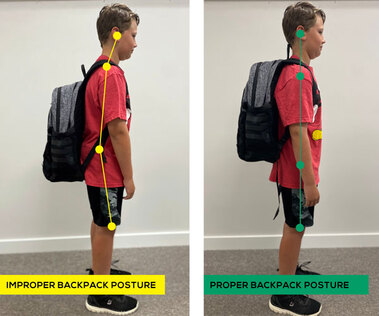|
I can't tell you often I get asked by patients about my favorite health products, foods, workouts, etc. So, I decided to put together an email where I can share some of the things I personally use and why I enjoy them. Each month, I'll feature new items or articles with links so you can easily check everything out for yourself! I hope you enjoy it, please feel free to leave a comment with any ideas or feedback! Want to receive my Monthly Mentions directly in your inbox? Email [email protected] and we'll add you to our distribution! Hunkerin Stool Chances are you've heard the phrase, "sitting is the new smoking". Well, this stool is the perfect way to avoid the negative effects of prolonged sitting in a traditional chair while still allowing your body to rest. I've got this stool in our living room and sit on it instead of our couch because it gives me just the right amount of support to stay in a deep squat for a long period and honestly, it's more comfortable for me. Sitting in a deep squat (aka the "Asian Squat") is the natural resting position for humans. This stool is a great vehicle to get into the deep squat resting position comfortably while activating the glutes and decompressing the spine. Xero Shoes The foot has 26 bones, 33 joints, and over 100 muscles, ligaments and tendons. But modern footwear, with all its extra cushioning, has weakened those bones and muscles and turned our shoes into essentially a cast. I've been a huge fan of barefoot shoes for a few years now - I find them to be more comfortable than typical shoes (the only thing I prefer more is being actually barefoot) and these shoes make your feet work. What do I mean by that? With each step in these shoes, you are strengthening your feet helping with posture, knee/hip pain, and overall balance. Ancient Nutrition Multi Collagen Protein My wife, Genevieve, and I have been using this collagen and protein supplement for the past year and love it. The unflavored powder is odorless AND tasteless and comes from quality sources (they also have flavored versions like chocolate and vanilla). Genevieve mixes a scoop in with her morning coffee and I usually put it in my water bottle. It's a quick and easy way to get extra protein in my day - and as a bonus - collagen helps improve the health of your joints, hair, skin, and nails. "Elon Musk" by Walter Isaacson Love him or hate him, Elon Musk's life story is absolutely fascinating. I just finished this biography by Walter Isaacson and it kept my interest from the first page to the last. I learned several surprising facts about his childhood, family (e.g. his grandfather was a chiropractor), and his career. From Space X to Tesla to The Boring Company, there's no denying this man is leading the way in our technology-driven world and will be for years to come. Add this one to your summer reading list! By Dr. Kevin Clark
0 Comments
Americans are sitting more than ever these days, with the typical office worker averaging about 15 hours of sitting a day. The lack of movement and the repetitiveness of sitting day-in and day-out causes our spines and bodies to malfunction, in other words, not work at their highest function. All of this sitting can lead to poor posture, digestive issues, low back pain, sciatica, and overall stiffness and discomfort, among other potential issues and sickness.
Getting daily movement - whether it’s through an everyday task like yard work or shoveling snow or a more intentional work out like lifting weights or going to work a fitness class (like Pilates) - is absolutely vital to our overall health and improving spinal mobility. There’s no arguing that. However, movement isn’t enough to get our spines (and health) back to functioning at its highest level, especially in how we live our daily lives in the 21st century. ADJUSTING TO RESTORE MOTION VS. MOVING WITHIN YOUR RESTRICTED NORMAL Getting adjusted is key to not only strengthening our spine and improving mobility - it helps RESTORE motion in areas of the spine that are, for lack of a better term, STUCK. Let me paint a clearer picture for you. The typical 40-something-year-old office worker has been sitting for somewhere around 8 hours a day for 5 days a week for 15+ years. The body has become accustomed to or adapted to this regular sitting desk posture. As a result, areas of the spine and body have become completely restricted or have a much limited range of motion. When I adjust a patient, I am aiming to start the process of restoring normal motion in those areas of the spine that have become restricted. While daily movement is providing motion to your spine and body, you are going through the range of motion that your body has adapted to (aka sitting posture) while those restricted areas stay restricted, or stuck. We are what we repeatedly do. Our daily actions and thoughts either promote health or promote sickness. So, as you set your intention for the day or the new year, consider incorporating daily movement in addition to getting adjusted into your wellness routine. Chiropractic isn’t just about pain relief, it’s about keeping your spine flexible and your body at the top of its game in order to live a vibrant, mobile everyday life! By Dr. Kevin Clark
1. CHOOSE THE RIGHT BACKPACK & WEAR IT CORRECTLY An ill-fitting, incorrectly worn or overweight backpack can be a precursor to spinal issues, contribute to bad posture, and even worsen existing problems. Below are a few pointers to follow when shopping for a new backpack:
2. PRACTICE PROPER CLASSROOM POSTURE
Proper posture: we know it’s important but most of us, especially children, do not consciously think about posture throughout the day. Correct posture plays a significant role in not just how we present ourselves to the world, but it can have significant effects on our overall health. How? Our spine surrounds and protects our spinal cord which is the most important part of our nervous system. Without proper spinal alignment, the nervous system can become compromised which can lead to a variety of different symptoms throughout the body. Here are 5 ways to support proper posture:
On average, U.S. students spend at least four and half hours sitting during the school day. For kids ages 8-18, an additional seven hours a day is spent in front of a screen. Combine the sitting at school and in front of a screen with driving to school, doing homework, and eating meals, kids are sitting 85% of their waking hours*! Our bodies are not designed to sit for that many hours in a day and the toll it’s taking on our spines is often manifesting itself as neck pain, sore muscles, mid-back pain, headaches, among other issues. Proper posture, in addition to spinal maintenance through regular exercise and chiropractic adjustments, can help mitigate these risks and prevent future issues. Together, they can ensure a strong, healthy, and confident start for your student this school year! By Dr. Kevin Clark *Source: 2010 survey by Kaiser Family Foundation – Generation M2: Media in the Lives of 8-18 Year Olds
The “treatment”? A night of quality, deep sleep.
Unfortunately, sleep in America is a total nightmare. According to sleep scientist and author of “Why We Sleep”, Dr. Matthew Walker, the average amount of sleep American adults get a night is around six hours and 31 minutes (in 1942, it was 7.9 hours). Interestingly enough, humans are the ONLY species on the planet to deprive themselves of sleep for no clear or beneficial reason. Think about that for a second. Why do we do this to ourselves when the benefits are so obvious? Many chalk it up to the busy lifestyles that we are consumed by each day. The culture of “busy” is often glorified while sleep and rest are looked down upon. But sleep is the foundation for optimal health and cognitive function. I often tell patients that if they have the choice between working out or sleeping, I tell them to sleep. Sleep gives time for our body’s systems to rest, heal, and recalibrate. So how can you start finding those oh-so-sweet dreams every night? Here are three things you can start doing right away to help improve your sleep and get you on your path towards consistent nights of quality, deep sleep. 1. GET MORNING LIGHT Go outside first thing every morning for at least 5-10 minutes to expose your eyes to natural sunlight (even if the sun is behind the clouds). This will help support and stabilize your circadian rhythm (your body’s master clock), sending signals to generate alertness and keep us awake and active throughout the day. At night, it initiates the production of melatonin (hormone that promotes sleep) and keeps transmitting signals that help us STAY asleep. 2. REDUCE SCREEN TIME & LIGHT EXPOSURE Blue light (from phones, computers, & tablets) suppresses melatonin production and STOPS it from being released causing us to stay alert throughout the night. An hour or so before your bedtime, switch your phone to Night Mode. This will change your screen color to a red tint (vs. the blue light). Here’s a link to instructions on how to quickly set this up on your iPhone. Try to keep your bedroom screen-free. Or, at least put your phone on airplane mode and replace scrolling time with reading or journaling to help your mind wind-down. The goal is to give your body the correct signals that night is coming, NOT that it needs to stay alert and awake. 3. FIND THE RIGHT TEMPERATURE Our central nervous system needs to drop two to three degrees from our baseline in order to get into our deepest sleep, as Dr. Matthew Walker shares on the Joe Rogan Experience podcast. Try adjusting your thermostat to bring down the temperature in your room. Another great way to help you wind down and decrease your internal body temperature is to take a warm bath before bed. This may sound counterintuitive but hear me out. When you take a hot bath, vasodilation occurs (this is a natural process that increases blood flow and decreases blood pressure). While you are enjoying your bath, blood rushes to the surface of your body. When you get out of the bath, a massive dump of body heat occurs causing your core body temperature to drop. So, why does a chiropractor care about sleep? Most people view chiropractors as only “back pain” doctors, but that's only partially true. Sure, we help relieve back pain but at the heart of it, chiropractors are nervous system doctors. And one of the main benefits of chiropractic is the balancing of the nervous system. Many patients of mine comment on how they sleep so much better after an adjustment. Why is that? Due to our high-paced, go-go-go lifestyle, most of us are stuck on overdrive with the sympathetic side of the nervous system turned on, aka "fight or flight" mode. Chiropractic care helps tone down the sympathetic side of the nervous system and activates the parasympathetic, "rest and digest", side–thus helping people sleep better. Looking for more tips? Leave a comment below with any questions or let us know what works for you! Improving your sleep can be a process but it’s worth it to wake up feeling refreshed and ready for the day. By Dr. Kevin Clark
1. Get Daily Movement Movement is key to overall health! Our favorite ways to incorporate movement are to take a walk outside (even in the dead of winter), regular strength and cardio workouts, yoga, and finding ways in everyday activities to get more movement (like parking further away from a store, taking the stairs, etc.) 2. Get Plenty of Quality Sleep Quality sleep is high on our priority list in the winter. We try to go to sleep and wake up at the same time every day and avoid screentime (computer, phone, and TV) ~30 minutes before bed to regulate our sleep cycles. This allows our brains to rest, bodies to heal, and our nervous systems to reset. 3. Hydrate Daily This is something that quickly goes out the window with busier schedules and social gatherings. I love having a daily glass of my favorite electrolyte drink (LMNT) to help hydrate my body. And, our family always increases our fruit intake during the winter with fruits that are naturally packed with H2O (like berries, oranges, and apples). 4. Boost the Vitamins Vitamin D with K2, vitamin C, and zinc are a regular part of our family’s morning routines to help keep our immune systems in top shape. You can’t supplement yourself out of bad health, but several studies show that these supplements can lower the severity of the cold and flu. 5. Get Adjusted A weekly adjustment is a must for my family. Getting adjusted positively impacts the function of the nervous system (this includes the spinal cord which is protected by the spine). An adjustment helps reduce the pressure along the spine, allowing the nervous system to detect and respond to external threats more quickly. The quicker our bodies can respond, the better equipped our immune systems are to fight off those cold and flu bugs! Have questions or would like more tips? Reach out to me at [email protected] or follow @chiroclarkdoc on Instagram or Facebook. By Dr. Kevin Clark
Below are three tips to help spot the difference between the two: 1. Timing Normally, muscle soreness shows up following a workout and lasts ~ 24-48 hours. If you feel intense pain or soreness instantly, that usually means an injury has occurred. Additionally, if the soreness or discomfort following a workout does not subside after ~4 days, this also may indicate an injury has occurred. 2. Location The location of your pain or discomfort can provide a lot of information. As a whole, muscle pain is felt broadly. If you have pain that you are able to pinpoint (i.e. a specific area in your low back), this typically is a sign of an injury. 3. 1-Sided vs. 2-Sided General muscle soreness usually shows up on both sides of the body because we engage both sides of our body when exercising. If intense discomfort or pain is felt on only one side of the body, it’s a greater indicator that an injury has taken place. So, what can you do? Listen to your body. If your house is on fire, the fire alarm hopefully sounds off right away to tell you that help is needed ASAP. Our bodies function similarly and have their own alarm system to warn us when something is wrong with our health. That alarm system is pain. While pain never feels good, it does mean that our bodies are functioning properly and alerting us that our body needs attention. The longer we let the alarm sound off, the more damage that is done to our house (or bodies). It is important to seek professional help, like a chiropractor, to help heal the injury as soon as possible. By Dr. Kevin Clark |
�
About the DocDr. Clark is the owner and head chiropractor of Clark Chiropractic in Darien, IL. He is a 4th-generation chiropractor with a passion for wellness. He enjoys researching the latest ways to increase longevity, cooking with his family, spending time outside, and helping patients live an active lifestyle. Archives
June 2024
Categories
All
|
|
Hours:
Monday, Wednesday, & Thursday: 7:45 AM - 11:00 AM + 3:00 PM - 6:30 PM Tuesday: 11:00 AM - 2:00 PM Saturday: 8:00 AM - 10:30 AM |







 RSS Feed
RSS Feed
